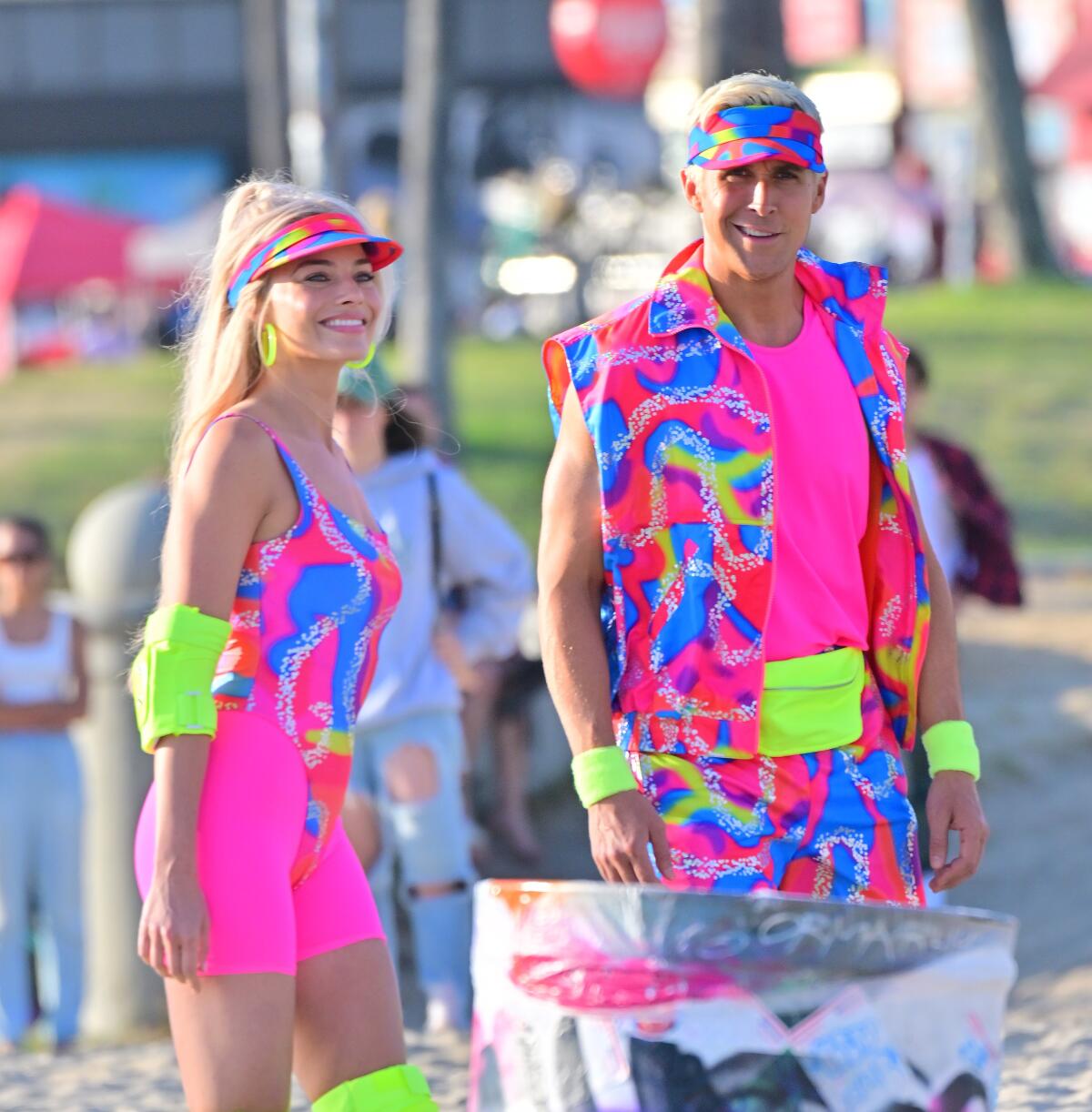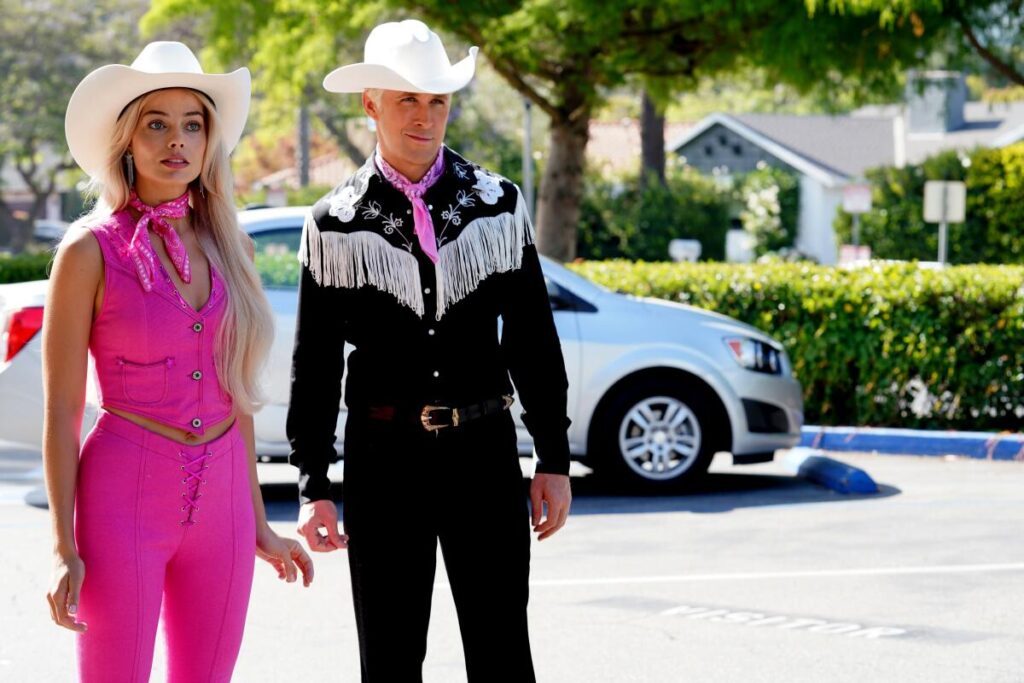After “Barbie” came out, Mattel sent costume designer Jacqueline Durran a box filled with its new collection of dolls, each wearing clothes based on her designs for the movie. “I got them all out and it was the strangest sensation to look in the boxes and see all of our costumes on the Barbies,” she says. “But it was amazing. It’s an amazing thing to have done, and I’m really proud to have worked on the film.”
Director Greta Gerwig enlisted Durran after collaborating with her on 2019’s “Little Women,” for which Durran won an Oscar. The costume designer admits there was “definitely a fear” about the prospect of doing “Barbie.” She wasn’t sure she was the right person to tackle such an iconic cultural emblem onscreen.
“I didn’t really question wanting to do it because I know Greta well enough to know that she was going to make a Barbie film that I liked,” Durran says. “I had total faith in her. But I just wanted to do it justice — that was the fear. You watch it now and it looks so straightforward and simple. But that took a lot of working things out and conversation because it was almost a blank page. How do you make a movie about Barbie? What are the rules for the dolls? How does the world work? You have to think about all of these things to make it coherent.”
Durran reunited with production designer Sarah Greenwood and set decorator Katie Spencer, who she has teamed up with numerous times, including on “Anna Karenina” and “Beauty and the Beast.” Everyone agreed that the aesthetic of the film should be beautiful, with a nostalgic nod to Barbie’s origins in the midcentury. Durran and Greenwood shared color palettes to ensure that the pink costumes worn by Barbie (Margot Robbie) and Ken (Ryan Gosling) worked with the pinks in the sets, but didn’t match them exactly. Greenwood’s angular design for Weird Barbie’s house directly inspired how Durran costumed the character, played Kate McKinnon.
“Weird Barbie could have been in rags or in a crazy costume that was just pieces of things put together,” Durran says. “But Greta said, ‘No, I think she should have a kind of fashion look about her.’ And I was like, ‘OK, where do I ground that? Where is it coming from?’ So I went in and I looked at the house and I walked around and looked at the patterns and colors Sarah put in there, and got those transposed from the wall to the dress.”
Barbie’s (Margot Robbie) hot pink cowgirl ensemble, which she wears for numerous scenes, was one of the most important to get right, says costume designer Jacqueline Durran. Ken (Ryan Gosling), she says, just had to match her look.
(Dale Robinette/Warner Bros. Pictures)
For the more traditional Barbies, Durran followed specific physical rules to maintain the illusion of the Barbie universe. She found that dresses looked more doll-like if they were shorter, and straight-cut, uncreased clothes maintained the sense that there was plastic underneath them rather than a human body. There was a lot discussion about what the characters would wear when Barbie and Ken arrive in the real world. Gerwig wanted them to feel like aliens on the Venice Boardwalk, so Durran reimagined Barbie’s iconic neon skating outfit and spray-painted two pairs of Rollerblades.
“It was such a crazy costume,” Durran says. “And it was also the first time the world saw Barbie and Ken, so it was really nerve-racking. We were on Venice Beach and it was like, ‘Oh no, here we go!’”
Barbie’s hot-pink cowgirl ensemble, which she wears for numerous scenes, including a chase sequence, was one of the most important costumes to get right. It defies what Durran calls “Barbie logic,” which dictates that Barbie is always wearing the perfect thing for what she’s doing at the time.
“How does she decide the perfect thing for being in L.A.? What is the absolute epitome of America that Barbie would identify with?” Durran says. “We tried out different things, including making her Malibu Barbie. It was a lot to work out. Now, to me, it feels like an obvious choice, but it wasn’t obvious at the time.”

Margot Robbie and Ryan Gosling wear their Venice Beach looks on the set of “Barbie.”
(MEGA / GC Images)
For Ken, Durran played up his obsession with Barbie. She imagined Gosling’s character as “almost like an accessory” where his main function is to just be there and match her look. The Kens could all be dressed the same because there wasn’t meant to be anything distinct about them. It’s not until Gosling’s Ken discovers the patriarchy in the Real World that their costumes begin to take on more life with short shorts, big fur coats — that nod to Sylvester Stallone — and headbands.
“They were really up for it,” Durran says of the actors. “I was nervous at the beginning that the Kens wouldn’t really want to go that far. I wasn’t even sure that the Kens would want to wear a white jumpsuit — it’s quite an extreme look. But they all just loved it. It was just so much fun to dress them.”
Durran estimates she and her team custom-made 450 ensembles out of the movie’s 1,000 total costumes. Some of Barbie’s looks, like the pink snowsuit, were existing pieces borrowed via a partnership with Chanel, while others were built from scratch using fabric printed specially for the film. Some costumes are replicas of existing Barbie outfits from Mattel’s history, which Durran wanted to include as Easter eggs for the fans.
“I wanted it to be something that was a pure pleasure to watch,” she says. “To me, the fans were the most important group who were going to be watching the movie — people that love Barbie — and I wanted to honor that.”

